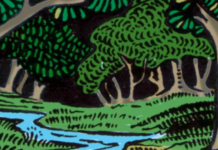
Woman’s Magic
, by Sue Bowers
Samuel Weiser, 1578632218, 165 pages (notes, bibliography & index), 1993
Once again I find myself tackling a book written for the feminine part of the Craft. Obviously, I approach this book from an outsider’s perspective.
On a personal level, I found the boldface type used to highlight the sections to be distracting in appearance. It seemed, somehow, as if it were amateurish (I really can’t describe it any other way). I even asked my son for his opinion, and his response was “Not a fan myself,” so I feel safe in assuming that it is not just a personal bias on my part.
Ms. Bowes says, on the third page of this book, “This ritual cries out for physical contact with nature, but you can adapt it for the comfort of your home.” This is one of the problems I have seen in the Pagan community lately. There is far too much emphasis on physical comfort. If you can’t be “inconvenienced” to go out into nature, you can’t really connect with the Divine.
Although she says frequently that this book is not about a feminist point of view, her presentation of history has a distinctly feminist interpretation to it. While this is not necessarily bad, it should be honestly acknowledged. “Allowing” women to go to a moon lodge is not the same as “banishing” them to such a location. Each of these is the result of a particular view of history and should plainly be stated as such.
She postulates a ten-fold return of negative workings upon the operator, which far exceeds the “Law of Threefold Return,” so commonly accepted in the Craft. I’m not sure where the ten-fold concept comes from, and it would be nice to know its origins.
I find it slightly incongruous that a British author is recommending Native American techniques of purification (smudging). This is simply one example of what some Pagans see as “cross-cultural fertilization” and what some indigenous people see as the theft of their spirituality. To use techniques from another culture without a thorough understanding of the originating culture is disrespectful, at a minimum, and dangerous in a worst-case scenario.
Ms. Bowes, like many of today’s authors, speak of contacting your spirit guide for inspiration and insight, as if all one has to do is flip a switch to make this connection. It takes serious work to connect to, and to maintain contact with, one’s spirit guide. It is not something to be undertaken without proper care and preparation.
The author speaks frequently about the spirituality of life in days gone by, and how women were constantly aware of their function holding it all together. This is, according to many, utter hogwash. Most people, in days past, were more concerned with simple existence. They were too busy simply living to give much thought to spirituality. Time to devote to spirituality is a modern luxury. Her view is of the past as many Pagan authors wish it had been.
This book presented me with some rather nagging problems. Most importantly is its heavily dogmatic approach, in areas. Even though Ms. Bowes repeatedly says that the reader should do what feels right, she continually says that certain things need to be done in certain ways, while giving only the slightest reasoning for those assertions.
Her presentation of dissolving karmic relationships is overly simplistic in my view. Most individuals could easily convince themselves about the accomplishment of resolving these conflicts, but it usually takes a great deal more work to do so, in my experience.
This book has a uniquely British flavor and may, because of this, be unusual enough to get people, in the United States, to pay attention. It has little emphasis on exact ceremonies or rituals, allows for a large degree of self-expression, and encourages the reader to look within for answers.
Do I recommend it for everyone? No, just as I wouldn’t recommend Wicca for Men by A.J. Drew for everyone. Many men will have difficulty in accessing the information herein. It is couched in terms and forms which are not much emphasized in today’s heavily male dominated society. There will be those women, also, who will experience difficulty with these concepts as they struggle to establish themselves as being the equal of any man.
The ideas contained in this book evoke a different energy than may be found in other, main-stream publication. This may very well help to bring about a true balance of energies in the world. There is so much emphasis today on dominating our environment (both personal and societal) that we sometimes lose sight of the ideas of cooperation and “going with the flow.”
If you are looking for a rather unique perspective on “feminine mysteries” without the emphasis on Dianic thought, this is the book for you. Read it. Let the ideas work their way through your psyche. You may well find your frame of thought and reference expanding far beyond what you have considered to date.








